Snubbed By Lebanese Opposition, Iran’s FM Stands Beside Terror Proxies
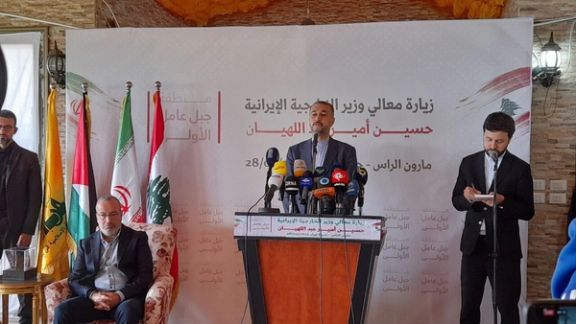
Iran’s foreign minister met with two of the regime's terror proxies during a visit to Lebanon, during which he was snubbed by Lebanese opposition.

Iran’s foreign minister met with two of the regime's terror proxies during a visit to Lebanon, during which he was snubbed by Lebanese opposition.
Hossein Amir-Abdollahian, met with the head of Iran’s most dangerous proxy, Hezbollah, as well as the head of the Palestinian Islamic Jihad Movement (PIJ) while Lebanese politicians boycotted the diplomat after a request to meet at the Iranian embassy in Beirut.
The embassy had invited all parliamentary blocs to the meeting except for MP Michel Mouawad - a presidential candidate running against Hezbollah-backed Suleiman Franjieh - and nine members of the Change bloc.
According to Asharq al-Awsat newspaper, the embassy had only invited MPs Melhem Khalaf, Yassine Yassine and Elias Jradi from the Change bloc, disregarding others vocally opposed to Iran’s political interference in Lebanon where it funds its most dangerous proxy, Hezbollah.
The Kataeb Party, the National Liberal Party and a number of independent lawmakers had announced their boycott of the meeting, which was finally attended by only 16 out of 25 of the invited MPs, the majority from the Hezbollah-led camp.
Hezbollah is responsible for major terror attacks across the world and is designated a terror group by states including the US and UK, as well as the EU and the Arab League.
Amir-Abdollahian also held a meeting with Lebanese Prime Minister Najib Mikati, in which the regime’s leading diplomat urged political factions in Lebanon to speed up the presidential elections. Since former president Michel Aoun's term expired on 31 October, there has been no agreement on who shall succeed him.
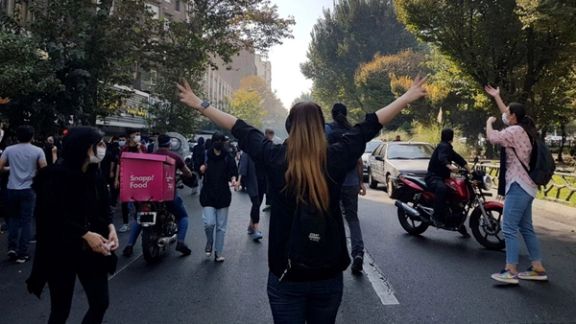
Worsened by revolutionary unrest, Iran jailed three times the number of writers in 2022 than 2021 as it cracked down on voices of dissent.
The findings, from PEN America’s latest Freedom To Write Index, puts Iran in second place globally, only beaten to the top spot by the dictatorship of China.
The crackdown on anti-government protests after the death in custody of 22-year-old Mahsa Amini in September led to the particular targeting of writers and artists alongside other cultural figures, celebrities and athletes.
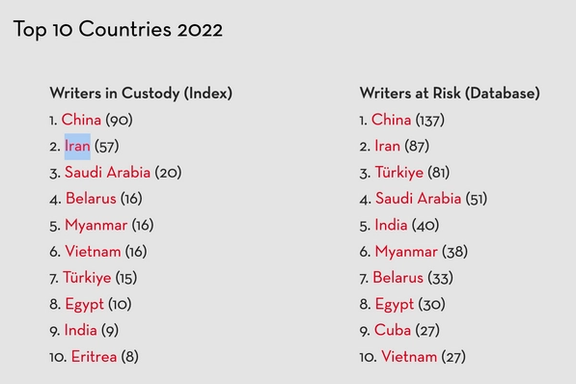
The numbers of those jailed rose from 22 in 2021 to 57, with one third of those behind bars now women, whose numbers rose from five to 16. The global study found that Iran jailed more than one-third of the total number of women writers jailed worldwide, 16 of 42 as the regime cracks down on the women led protests sparked by the death in custody of 22-year-old Mahsa Amini.
Some of the country’s leading voices have been severely punished, including Nasrin Sotoudeh, who was threatened with being returned to jail after speaking to or writing for international media outlets; author and activist Narges Mohammadi, who bravely continued to speak out from Evin prison; and writer Golrokh Ebrahimi Iraee, arrested in September.
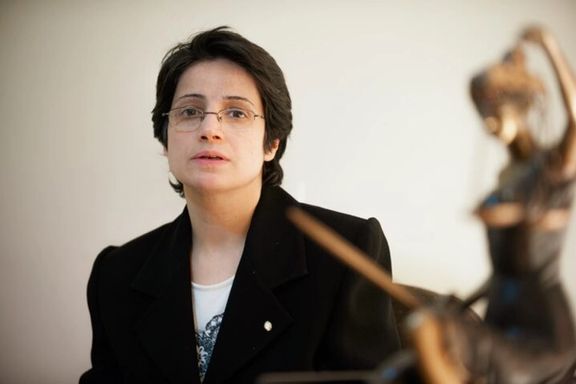
“Iran’s creative community—long at the forefront of fighting for free expression and human rights—was singled out as part of a broader crackdown on dissent in 2022,” said Karin Deutsch Karlekar, PEN America’s director of Free Expression at Risk Programs.
“Alongside the dozens of writers and artists detained, the harsh sentences handed down and custodial abuse faced by some prisoners were an attempt to warn others to keep silent.”
In 2022, 311 writers were jailed globally according to PEN America, whose database contains 813 active cases from over 80 countries of writers, poets, online commentators and journalists at risk for their writing.
Karlekar called on the United Nations Human Rights Council, Special Mandates, and newly-established Independent International Fact-finding Mission on the Islamic Republic of Iran to include a consistent focus on writers and artists in their investigations, reports, and public statements.
In its systematic targeting of writers, artists, and dissenting voices with arrest and detention, the Iranian government often deploys spurious charges based on national security or “propaganda against the state” to charge and sentence individuals. Some alleged “offenses,” such as mohrabeh, or “war against God,” potentially carry the death penalty.
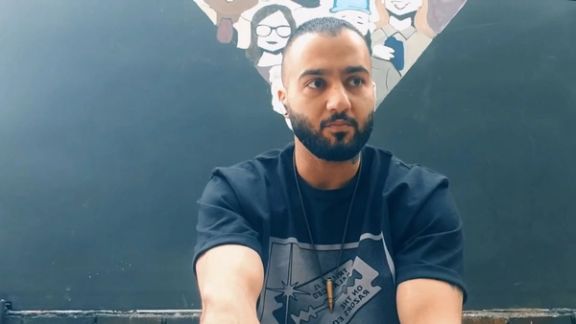
The government has also singled out artists and singers whose work was critical of ruling authorities and explicitly addressed either political or social themes, including rappers Saman Yasin and Toomaj Salehi, both arrested in October and charged with mohrabeh, or “enmity against God,”. Both men have undergone torture in custody.
Poet and filmmaker Baktash Abtin died a tragic and preventable death in custody on January 8, 2022, after authorities repeatedly refused to provide him needed medical care. Severe abuse was also recorded in the case of blogger Hossein Ronaghi, detained in late September, subjected to ill-treatment in custody and denied medical care.
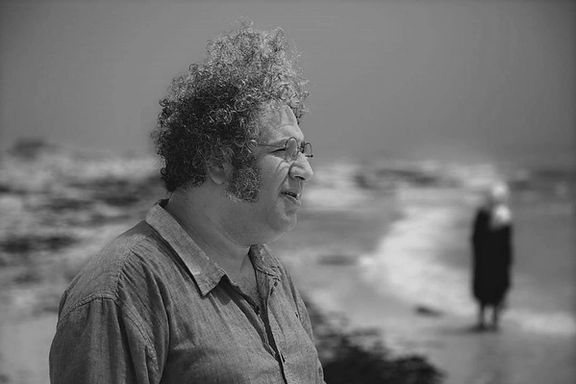
Shorter periods of detention have also been handed down to several dozen writers and poets supporting the protests, many of whom have also suffered torture and mistreatment in Iran’s brutal jails.
These have included the poet and theater director Amirhossein Barimani, literary writer and commentator Farshid Ghorbanpour, and poets Mona Borzouei, Behnaz Amani, Atefeh Chaharmahalian, Behrouz Yasemi and Saeed Heleichi.
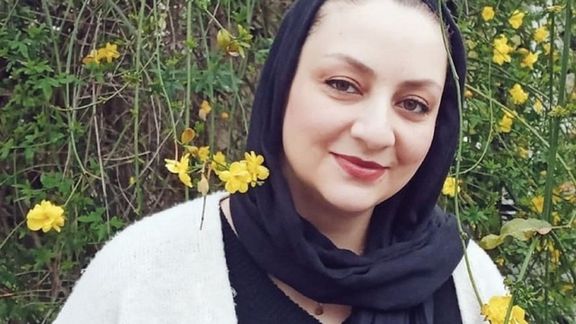
Writers advocating for ethnic or religious minority rights continue to be particularly targeted, including Kurdish language teacher and rights advocate Zahra Mohammadi, Kurdish researcher Mozghan Kavousi, and Bahai writer and poet Mahvash Sabet.
Since protests began in September, over 500 civilians have been killed by regime security forces with around 20,000 arrested. At least four executions have taken place for protesters and an unconfirmed number of many others sentenced to death for their role in the uprising.
Rights groups say executions last year rose by 75% on the previous year with at least 582 people put to death in 2022.
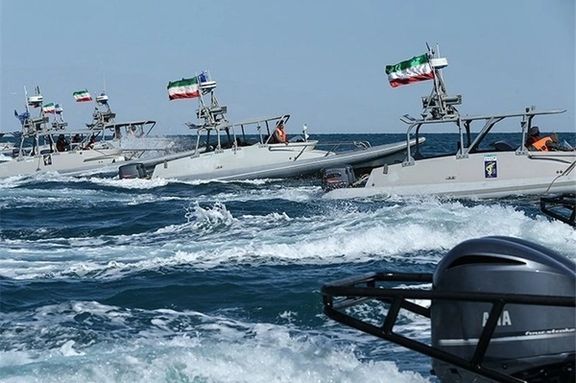
A vessel has come under attack from three boats with three or four people aboard south of Yemen's coastal town of Nishtun with shots being fired at the vessel.
Britain's Maritime Trade Operations (UKMTO) reported the attack on Friday without further details on the vessel or the perpetrators.
The Gulf of Aden is a crucial route for global trade and has seen numerous attacks attributed to Yemen’s Iranian-backed Houthi rebels amid the civil war in the country as well as the proxy war between Tehran and Riyadh.
The region was also once plagued with Somali pirate attacks, but they have significantly decreased in recent years. It is not clear if the Friday attack is the work of Houthis or pirates.
Nishtun is held by forces allied to Yemen's internationally recognized government, backed by the Saudi-led coalition, but Houthi attacks have happened there before such as in December 2020.
The attack occurred a day after Iran’s navy seized a Marshall Islands-flagged oil tanker in the Gulf of Oman amid wider tensions over Tehran’s nuclear program.
The US Navy’s Mideast-based 5th Fleet identified the vessel as the Advantage Sweet.
Satellite tracking data for the vessel from MarineTraffic.com showed it in the Gulf of Oman just north of Oman’s capital, Muscat, on Thursday afternoon. It had just come from Kuwait and was carrying crude for Chevron to Houston, Texas.
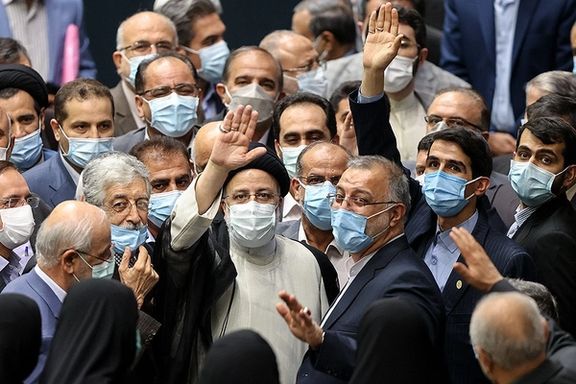
An influential commentator in Iran says the weak performance of President Ebrahim Raisi's administration has seriously terrified his conservative allies.
Mohammad Mohajeri, a conservative himself and former editor of hard-line daily Kayhan, has said in an interview that conservatives believe the current government has left such a bad record that its opponents are highly likely to win the next parliamentary and presidential elections.
"However, their fear may be baseless as the supporter of reformists and a large part of Iranian voters are not willing to take part in the elections," Mohajeri said, adding that nonetheless, conservatives will continue their smear campaign against relative moderates such as former President Hassan Rouhani, former Majles Speakers Ali Larijani and Ali Akbar Nateq Nouri.
Meanwhile, Mohajeri said in another interview that Iran's reformists and conservatives have influence only among 15 to 20 percent of the society. He also charged that 90 percent of Iran's Friday Prayer Imams belong to the conservative camp and the Friday Prayers are a podium for only one political faction.
However, a national reconciliation is possible in Iran only if the government facilitates the political participation of all political groups in the elections. He added that there is not much time for that as fierce campaigning for the parliamentary elections will start in around two months from now.
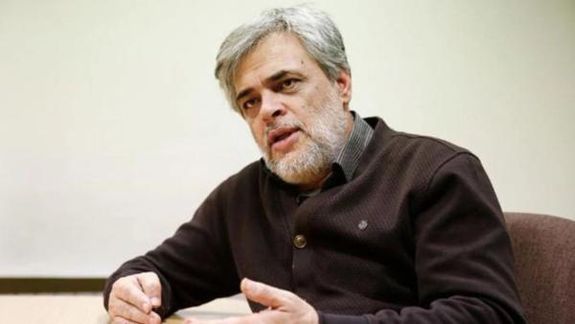
He suggested that to facilitate political participation, the government needs to bring about essential changes in economic, political and cultural arenas. He argued that the government's inability to improve the economy will keep deeply disillusioned voters away from the ballot box.
Many people are also currently annoyed by the government's unilateralism. Enforcing compulsory hijab and filtering the Internet have deeply annoyed the people so that they are reluctant to take part in political activities such as voting in the elections.
However, Mohajeri said in the interview that some ultraconservatives including those around the housing minister Mehrdad Bazrpash have already started their campaign.
Mohajeri warned that if the government does anything beyond what has been stipulated in the Constitutional Law, the people will feel their essential rights have been undermined.
Many protesters during the past months chanted slogans against Iran's rigid Constitution which gives every right to hardliner clerics to restrict the freedom of the populace.
Meanwhile, he lashed out at the government's heavy-handed approach against unveiled women and said that it was quite clear from the start that policies such as launching a morality police would face resistance by women.
Agreeing with Mohajeri on the situation of the current government, Sharyar Heidari, a member of parliament told Rouydad24 website in Tehran that in the next election Raisi is not likely to win a quarter of the votes he received in 2021.
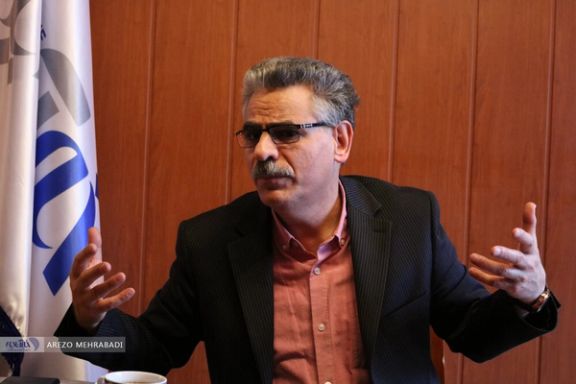
In another development, Iranian sociologist Nematollah Fazeli said in an interview with Khabar Online that the government does not have a true understanding of the people's demands. Fazeli said the government would have been at ease to accept some of the demands of the people if they were simply about the economy. But the people's understanding of politics and the gender issue has changed over the years and the government cannot understand that.
"Women had a focal position in the recent movement in Iran although there were other activists too. This is caused by a major development in social knowledge in Iran," he said, which “emanates from within the society and its everyday life and the people's collective experience."
Fazeli added that the understanding what happened in Iran during the past months requires a thorough understanding of women's role, but little attention has been paid to this matter by any government entity. This requires a new look at women and femininity, an issue that has been marginalized after the 1979 Islamic revolution, the sociologist said.
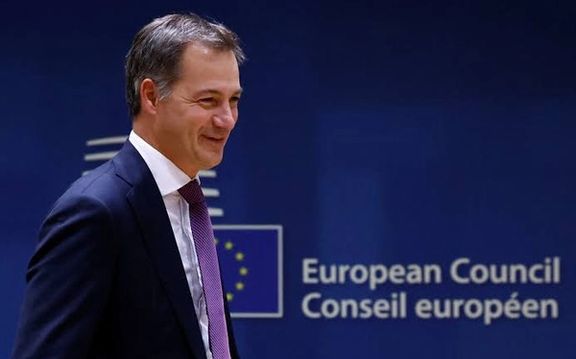
After outright denials on Wednesday, Belgium says it is examining Iran's request for a prisoner swap.
Alexander De Croo, Belgium's prime minister, said on Thursday that the government is currently evaluating Iran's request to swap jailed Iranian diplomat Asadollah Assadi for the detained Belgian aid worker Olivier Vandecasteele.
The Belgian Constitutional Court upheld a prisoner exchange treaty with Iran in March that could result in Assadi being swapped for Vandecasteele.
De Croo called for Vandecasteele's immediate release from Iran, one of an unknown number of diplomatic hostages held by the regime.
Only on Wednesday, the spokesperson for Belgian Justice minister Vincent Van Quickenborne denied a deal had been reached, calling it “a false message from a rogue state that specializes in making false statements".
Meanwhile, Daria Safaie, a member of the Belgian Parliament of Iranian origin said on Wednesday that to her specific question as to whether or not Belgium discussed the extradition of Assadolah Assadi, the foreign minister evaded the answer, suggesting there may be some hesitancy in Brussels as to the implications of moving forward with negotiations with a rogue state.
Former Iranian embassy attaché, Asadollah Asadi, 51, is currently serving a 20-year sentence in Belgium for alleged attempted murder and involvement in terrorism for his role in plotting a bomb attack near Paris in 2018 against the Mujahedin-e Khalq Organization (MEK), an opposition group in exile.
Security forces in Iran arrested aid worker Olivier Vandecasteele, 41, who has worked in a variety of humanitarian agencies since at least 2006. In January he was sentenced to 40 years behind bars and 74 lashes.
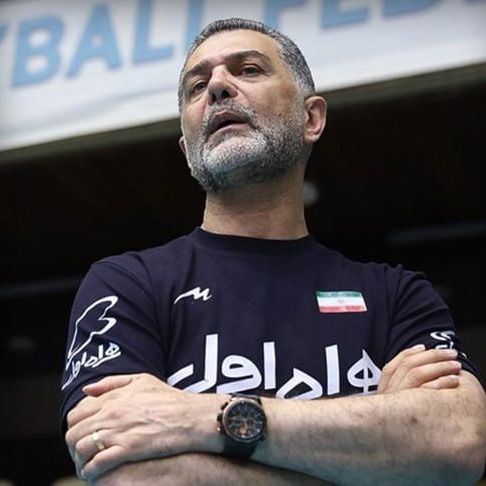
Iran's national volleyball team coach says the team declined a friendly match against Russia, citing Western sanctions on Moscow.
Behrouz Ataie told state radio on Thursday that “we rejected it due to the sanctions which might have some consequences for us".
He said playing against Russia risks problems for the team along with its staff and coaches if the visas are seen by the US embassy in the future, if players and staff, or the team want to visit the United States.
In response to Russia's attack on Ukraine, sanctions have been imposed on Russian national teams, which means that Russian athletes will not be able to participate in the Olympics and other international events.
Several international sports leagues and organizations have banned Russian athletes from competition since its invasion of Ukraine last year. A number of sanctions have been imposed against Belarus, which allowed Russia to stage the invasion using its territory.
Sports as diverse as tennis, soccer, volleyball, basketball, ice hockey, auto racing, and track and field have been affected by the actions.
International soccer's governing body, FIFA, as well as its European counterpart, UEFA, have banned Russian national teams and clubs out of international competitions.
Iran is already suffering at the hands of global sanctions for both its nuclear program and sanctions imposed for human rights violations in protest crackdowns and as such, teams are hesitant to risk further punishments as has been levied to Russian athletes.